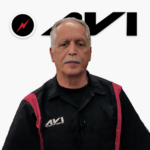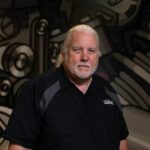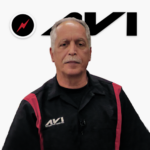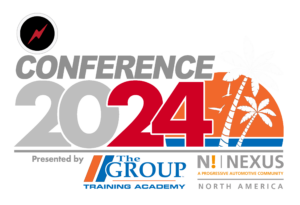
2024 Conference Courses
Ford Lightning EV Technology
Upcoming versions of the Lightning will introduce new performance enhancements. You'll have the chance to examine a Ford Lightning and explore its features firsthand. AVI will showcase its Ford Lightning, demonstrating service procedures and safety protocols.
The following items will be covered:
- Safety
- Removing high-voltage power
- Required equipment for service and repair
- Maintenance needs and implementation
- Service tips
- Gaining access to components
- New technology
Instructor

Larry Cardell
Date & Time
Friday January 12
8:30am – 12:00pm
NGK - Driveability Diagnostics
This courses objective is to effectively communicate vehicle diagnosis to the service advisor and creating best practices to streamline the diagnostic process through “real-world” data and cases studies.
The following items will be covered:
- Discussing the inputs, processing, and outputs at the core of today’s engine management platforms.
- Analyzing ignition and sensor operations for domestic and import applications.
- Understanding manufacturer-specific fuel trims vs. OBDII generic fuel trims to fast
- track the diagnostic process to find the root cause of some driveability issues.
- Using scan-tool data PID information to its fullest potential. Applying logical methods to streamline the diagnostic process on both domestic and import applications.
- Understanding vehicle systems, driveability diagnostic steps, and walking through the scan tool data PIDs to fix the car right the first time.
Instructor

Philip Austin
Date & Time
Friday January 12
8:30am – 12:00pm
Bosch - ADAS
The Advanced Driver Assistance Systems (ADAS) are found on most all vehicles today. Current model vehicles come standard with some type of collision avoidance or self-parking systems. You may have driven or even own a vehicle with some of these advanced features. In order to repair an ADAS fault or calibrate the systems, you really need to understand how all the cameras, sensors and others components operate. This course will give you a better understanding of all the components that a vehicle may have supporting ADAS equipped vehicles, how they operate and replacement procedures. We will also feature calibration processes for most components found on today's vehicles.
Instructor
Date & Time
Friday January 12
8:30am - 12:00pm (Pt. 1)
1:00pm - 4:00pm (Pt. 2)
Cummins 6.7 Diesel
Did you know the high-output Cummins 6. 7 has less compression? This course will explore the design, functioning, and evaluation of Cummins 6. 7 diesel engines, which require a strong troubleshooting skillset for effective servicing. AVI will guide you through the diagnostic processes for the Cummins 6.7, enabling you to gain insight into the latest advancements, such as hydraulic lifters and more.
The following items will be covered:
-
- Engine repairs
- Camshaft and lifter replacement without pulling the head
- System operation
- Turbo system testing
- High-pressure pump types and testing
- Fuel system testing
- Demo fuel system testing
- SCR, EGR, and DEF testing
- Scope testing
- Plus much more
Hands-On Air Brake
This course aims to actively involve participants by providing them with practical insights into the functioning of air brake components. During the course, attendees will construct an air brake system, connect its components, and verify proper functionality. The course will also delve into in-depth discussions regarding base friction systems, along with explanations and adjustments specific to various types of disc air brake systems.
- Compressor
- Governors
- Air dryers
- Plumbing
- Relay valves
- Anti-compounding valves
- Treadle valve
- Chambers
- Spring brakes
- Disc air systems
- ABS systems and scan tool use
- Testing for air leaks
- Air Brake component diagnostics
- And much more
** Please bring your safety glasses
The 4 Pillars of a Successful Shop
Successful shops have a common thread, they have leveraged the 4 pillars as the foundation of growth, and customer satisfaction! In this session you will learn how you can maximize these pillars to continue the growth and success of your shop. Most shops utilize each pillar daily but never use them to their fullest extent. As a result of this class, you can expect your average daily sales and average repair order to increase. Productivity, efficiency, and customer satisfaction will also benefit.
Chevy Bolt Technology
Check out the technology behind the Chevy Bolt in this brand-new class. Learn about the Chevy Bolt for real-world safety and service procedures at this event. Do not miss your chance to service this popular low-cost EV; get in on the opportunities for your shop today!
The following items will be covered:
-
- Safety
- Verifying high-voltage power
- Required equipment for service and repair
- Maintenance needs and tips
- Safety disconnect procedures
- Gaining access to components
- Component locations
- A quick look at General Motors' new model EVs
Garage Guru's - Advanced Oscilloscope Engine Testing
This clinic will focus on the different types of electronic engine diagnostic procedures used to diagnose today’s engines. Both in [1]cylinder pressure transducers and manifold vacuum transducers used with a digital storage oscilloscope (DSO) can reduce valuable diagnostic and teardown time on today’s VVT-equipped multi-cam engines. Engine performance and emissions can be severely impacted by cam timing concerns caused from a lack of oil, failed timing chain tensioners, and/or stretched timing chains or belts. Volumetric efficiency reductions caused by lack of airflow concerns from restrictions in the intake or exhaust systems can cause Low Power concerns. Engine compression issues can be significant in size or very small, almost undetectable at times, leading to misfire DTCs. Relative compression testing can reduce the time it takes to validate a compression issue on an engine. These types of problems can skew the diagnostic information in the scan tool and can make it unreliable or unclear. In this clinic you learn the benefits of using modern diagnostic equipment and when to use these testing techniques.
After completing this clinic, the student will have the knowledge to:
- Identify what tests to apply to accurately pinpoint the cause of engine performance concerns such as lack of power, run roughs, air leaks, and engine misfire.
- Perform relative compression tests using both scan tools and lab scopes with a high amp current probe.
- Perform mechanical engine testing and diagnosis using electronic pressure transducers.
- Validate engine camshaft to crankshaft correlation accurately using lab scope tests.
- Utilize new scan tool information and techniques to reduce diagnostic time in the service bay for VVT-related faults or symptoms.
Service Advisor Success Blueprint: Mastering Communication with Bill Haas
Gain the essential skills to excel as a service advisor. This course covers the key elements of successful communication, enabling you to establish strong connections with both customers and technicians.
As a service advisor, effective communication is paramount to building trust, providing exceptional customer experiences, and ensuring smooth interactions with technicians. Learn practical strategies for engaging with customers in a customer-centric manner, understanding their needs, and delivering solutions that exceed their expectations.
Learn how to foster seamless communication with technicians, ensuring clear and efficient service workflows. Explore techniques to relay customer requirements accurately and facilitate open dialogue, allowing for optimal collaboration between service advisors and technicians.
Now, you have a comprehensive blueprint to navigate the complexities of service advisor communication. Be equipped to create a positive impact on both your customers' experiences and your service team's effectiveness.
EV A/C Systems and Compressors
This course will address the design and functioning of air conditioning (A/C) systems in hybrid and electric vehicles. These systems exhibit various configurations, ranging from compressor drive mechanisms, including sole belt-driven and belt/electric hybrid, to entirely electric setups, which can operate on either AC or DC voltage sources. Additionally, we will provide a concise overview of the refrigeration cycle. Throughout the course, we will demonstrate the practical aspects of the operations, testing, and diagnosis of these A/C systems. AVI will guide you through the diagnostic procedures with our electric compressor demonstration system. We will showcase all the essential testing and repair techniques required. Witness the process and then have the opportunity to apply these techniques yourself.
The following things will be covered:
- R1234yf Vs R134a
- Service safety
- System operation
- System testing
- Compressor types and testing
- Leak testing
- Hands-on demo on A/C electric mockup
- Test equipment required
- New Honeywell A/C dyed 1234yf
- Plus much more
Instructor
Date & Time
Saturday January 13
8:30am - 12:00pm (Pt. 1)
1:00pm - 4:30pm (Pt. 2)
Hands-On Can and F Can
This course will cover the design, operation, and testing of F-CAN systems like no other class you have attended. This is a hands-on course with you sitting in an air-conditioned classroom and working on F-CAN systems. AVI will take you through diagnostics on our F-CAN demo system. We will demo testing and repair techniques. See it and do it for yourself in this hands-on F-CAN class.
The following items will be covered:
-
- You will power up the CAN system
- System operation
- You will test the CAN system
- You will bug your system and test it
- Scope testing on the CAN system
- New updates coming to networking
- Test equipment required
- Plus much more
AVI will take you through diagnostics on our F-CAN demo system. We will demo testing and repair techniques. See it and do it for yourself in this hands-on F-CAN class.
Instructor
Date & Time
Saturday January 13
8:30am - 12:00pm (Pt. 1)
1:00pm - 4:30pm (Pt. 2)
Modern Lighting
Headlights have been a part of automobiles all the way back to the beginning when lanterns were used as headlights. Headlights serve one main purpose which is to illuminate the road. Headlight bulbs have evolved from simple filaments to complex HID, LED, and laser designs. Headlights must provide enough light at highway speeds to ensure the safety of the driver but at the same time cannot blind oncoming traffic. Nanotechnology has led to LED micromirror designs that were not possible in the earlier years of the automobile. This course will explore new headlight designs, and break down the differences between Candelas, lumens, watts, Kelvin, and pixels. This course covers generic headlight aiming procedures and DOT regulations. We have also included a section on headlight control systems which illustrates the complex design used in late-model vehicles.
The following items will be covered:
- Modern Lighting Overview
- Modern Lighting/Adaptive Headlights
- Modern Lighting Testing
- Modern Lighting Controls
- Aiming Headlights
- Diagnostics
Standard Motor Products - Torque Management/Electronic Throttle Control
Electronic Throttle Control (ETC) is more than just electronically moving a throttle blade. When the accelerator pedal is depressed, the ECM recognizes the pedal sensor position as a torque request. The torque management system will then process the request and deliver the desired engine torque using the throttle blade position, phasing the cams, controlling spark timing, and other outputs. The primary inputs for ETC systems are the APP and TP sensors. Early systems used contact type potentiometers that wear out and create signal glitches that can be difficult to diagnose. After completing this class, a technician will:
The following items will be covered:
- Understand the torque management system and identify components
- Be able to diagnose sensor and electric motor faults
- Know how to service ETC systems properly
- Perform relearn or calibration procedures
- Know how to use scan data for effective diagnosis of these systems
Heavy Duty DPF and SCR Systems
Heavy Duty Emission systems have grown more complicated in the last few years, are you up to date? The latest information on the systems and their operation & diagnosis. Covering all systems from the engine to the after treatment systems you'll be ready to fix them all.
• Investigate high pressure pump failures.
• Learn about injector Issues and how to effectively test them.
• Understand the intricacies of emission system diagnostics.
• Gain an understanding of how SCR and DPF systems operate.
• Learn how to perform Nox sensor testing.
Creating a Business Model for Electric Vehicle Service
Previous advancements in vehicle technology have NOT impacted your store operations or your ability to be profitable. The electric vehicle changes that.
This business class is designed to look at everything differently. We will cover what the differences will be in marketing, talent, technical training, facility and equipment, client communication, and key performance indicators to be profitable in this new era.
There are important elements to being successful as an Electric Vehicle service center. Learn to assess and plan for:
- Branding – how will consumers know your level of expertise
- Marketing – is there a market to serve? How does it change and when
- Hiring or developing the technician specialist
- Technical knowledge and resources
- Facility requirements and updates
- Service bay equipment investments
- Service advisor specialization for Electric Vehicle maintenance and repair
- Your Electric Vehicle service impact on your goals, KPIs, ROI, and profits
Delphi - U-V-W's of 3-Phase Motors
3-Phase electric motors are gaining popularity in both high voltage and low voltage applications. Delphi veteran tech trainer Dave Hobbs will familiarize you in the operation, applications and diagnostics of these unique electric motors.
LOW Voltage Versions
- BLDC 3-phase pump common applications (fuel pumps & fan motors)
- Theory of Operation / Wiring schematics
- Diagnostics – Scan PIDs, Meter Readings and Scope Patterns
HIGH Voltage Versions
- Inverter operations for traction / starter / generator applications
- Phase Resistance Testing
- Diagnostics – Scan PIDs, Meter Readings and Scope Patterns
Standard Motor Products - Domestic Anti-theft
Anti-Theft systems have become more complex in recent years. These systems are now being integrated into other systems such as TPMS and Remote Keyless Entry. While the operating methods haven’t changed much, many unique service procedures have been introduced due to the increased security.
This class will further increase the technician’s understanding of modern Anti-Theft systems and introduce methods to simplify diagnostics. Case studies will be presented showing real-world failures, programming procedures, and resolutions when a programming procedure fails.
- After completing this class, a technician will be able to:
- Understand the theory and operation of Domestic Anti-Theft systems
- See useful tools for diagnosing Anti-Theft systems
- Diagnose Anti-Theft related faults
- Understand the purpose of NASTF Vehicle Security Professional Registry
- Replace Anti-Theft components
- Perform programming and reset procedures
HD Cummins Insights
Cummins engine series is extremely popular and is used in many medium and heavy duty applications. With the advent of complex emission systems even these engines suffer failure. Cummins continually improves these systems and the best way to analyze these engines is with the Cummins Insight. Will show you the best way to diagnose most any failure using this OE tool. As we know, non-OE level tools may not offer the same capabilities of the OE tool.
Cummins Insight works with QuickServe to ensure the quickest and most accurate diagnostic routines. Quickserve will be covered also.
Instructor
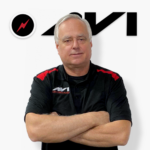
Tom Rayk
Date & Time
Saturday January 13
1:00pm - 4:30pm
X, Y, Zs of Hiring
Hiring today is vastly different from what it was 10 years ago or even 10 days ago. It is evolving and changing rapidly as employees have different wants, needs, and expectations when it comes to their jobs. Create messages that invite the best to consider joining your team. Make offers that align with their expectations of spending a part of their life within your organization. Acknowledging the diversity of generations X Y and Z is critical to providing the environment, culture, benefits, etc. that they desire. Develop a hiring strategy that defines success for both employer and employee. Create a thriving business that employees want to work for and are proud to have on their resume.

